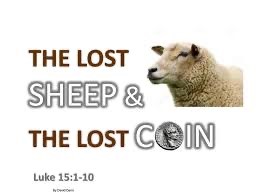Message for Sunday, September 11, 2022
Brothers & Sisters,
This week I share with you from the website: https://interruptingthesilence.com/2013/09/23/when-we-are-good-and-lost-a-sermon-on-luke-151-10/
“This fellow welcomes sinners and eats with them” (from Luke 15:1-10; Proper 19, Year C). That’s what the Pharisees and scribes said about Jesus. So how does that strike you? What do you hear in those words? Are they words of complaint and disagreement or ones of hope and invitation?
At one level the words of the Pharisees and scribes are simply a statement of fact. That’s what Jesus did. He ate with tax collectors and sinners. Not only does Luke tell us this but so do Matthew and Mark. At another level they are an accusation, an indictment, and a judgment. In the eyes and words of the Pharisees and scribes, Jesus is guilty of violating the law and social norms of the day. At the deepest level, however, their words are, ironically enough, a statement of the gospel. They have just spoken the good news. Jesus not only welcomes the sinners, he eats with them. Eating with them means there is relationship and acceptance. Jesus has aligned himself with them. He is on their side.
Throughout the gospel stories Jesus chooses to hang out “with the wrong kind of people.” That’s why in today’s gospel the tax collectors and sinners were coming near to listen to Jesus. He offered them something no one else could or would. That’s also why the Pharisees and scribes were grumbling. Jesus was breaking the law, crossing lines, and making God just a little too easily available.
I wonder if the fact that Jesus chooses to hang out with the wrong kind of people is why we might not hear these words of the Pharisees and scribes, “This fellow welcomes sinners and eats with them,” as good news. The difficulty for most of us is that we don’t see ourselves as the wrong kind of people. To the contrary we try really hard to be the right kind of people.
The starting point for Jesus is grace: searching not blaming, finding not punishing, rejoicing not condemning.
Notice the parables Jesus offers. They are not about being wrong. They are about being lost. A sheep is lost. A coin is lost. There is nothing about culpability, blame, or finding fault. That doesn’t seem to be Jesus’ concern. His concern is for the one that is lost, missing, absent. Jesus doesn’t explain how the lost one became lost. He doesn’t blame or judge. That’s not the issue. The issue for Jesus is recovering and reclaiming the lost.
Jesus has enlarged the definition of sin. He has expanded the purview of grace. The Pharisees and scribes want to make it about the character of sinners and tax collectors. That happens whenever sin is defined as only a legal category of failed or aberrant behavior. Jesus, however, makes it about God’s character. That’s the point of these two parables. They reveal God’s character, God’s grace, God’s way of being toward us revealed in and through Jesus.
That grace and character are revealed in Jesus’ searching, finding, and rejoicing. Those are not three different things, three separate actions or moments in time, but three manifestations of God’s one grace. They are the ongoing presence of God in Christ in each one of our lives. Depending on the circumstances of our lives we experience that grace differently, as searching, finding, or rejoicing. Ultimately, it means there is a place set for each one of us at the table. We matter. We are desired by and important to God. This “fellow” who welcomes sinners and eats with them is constantly searching for us, finding us, and rejoicing over our presence at his table.
Contributed

